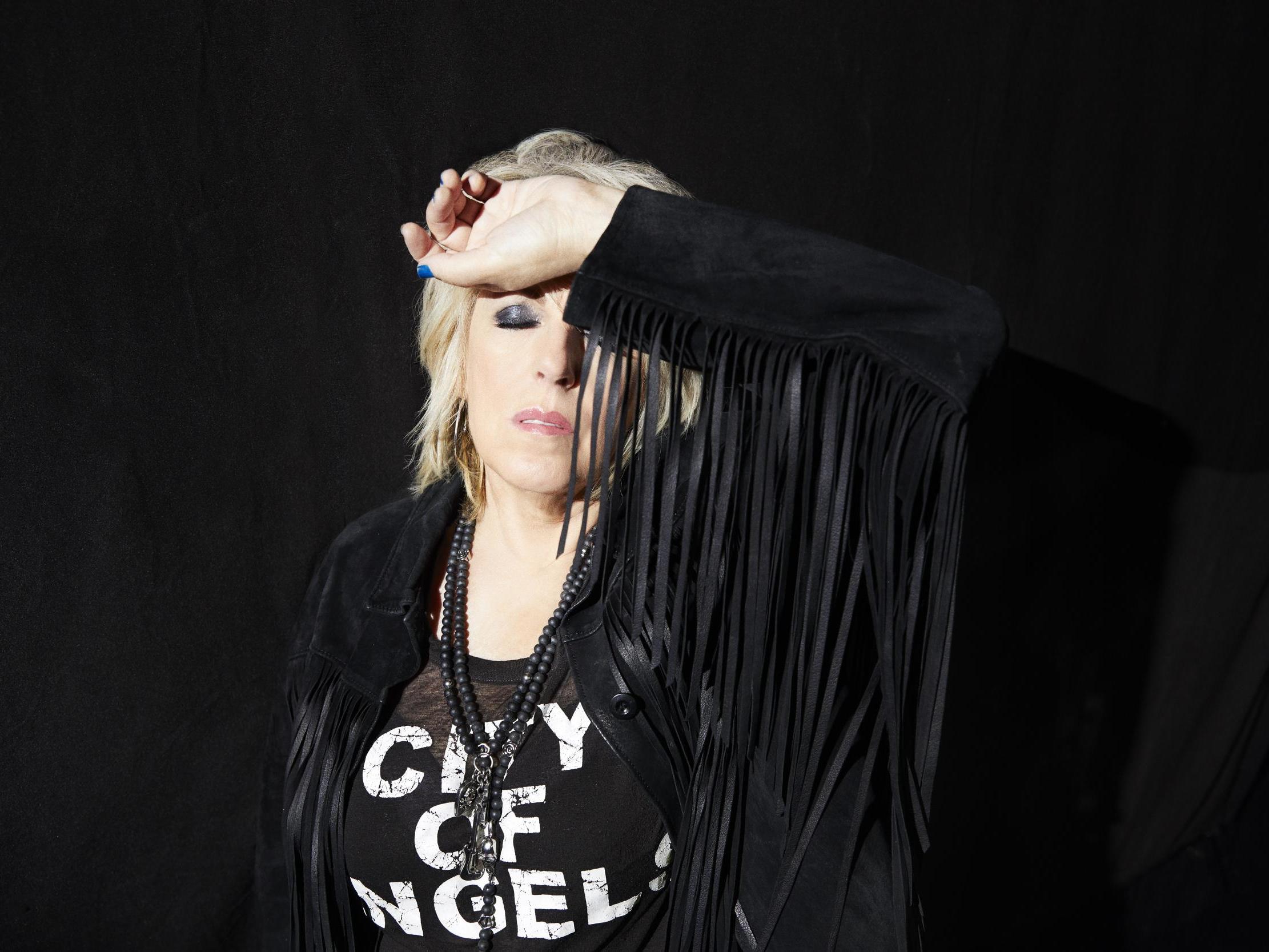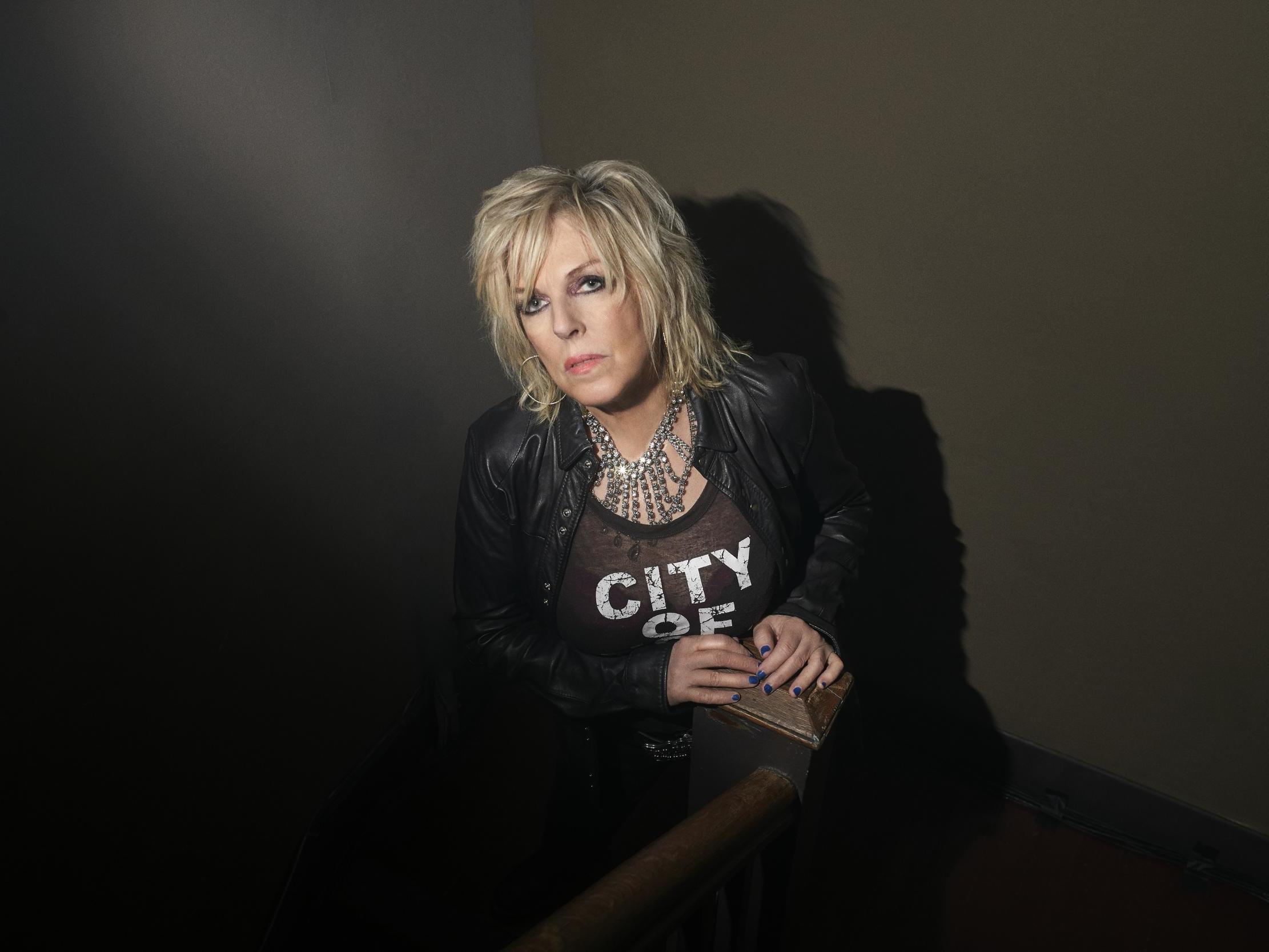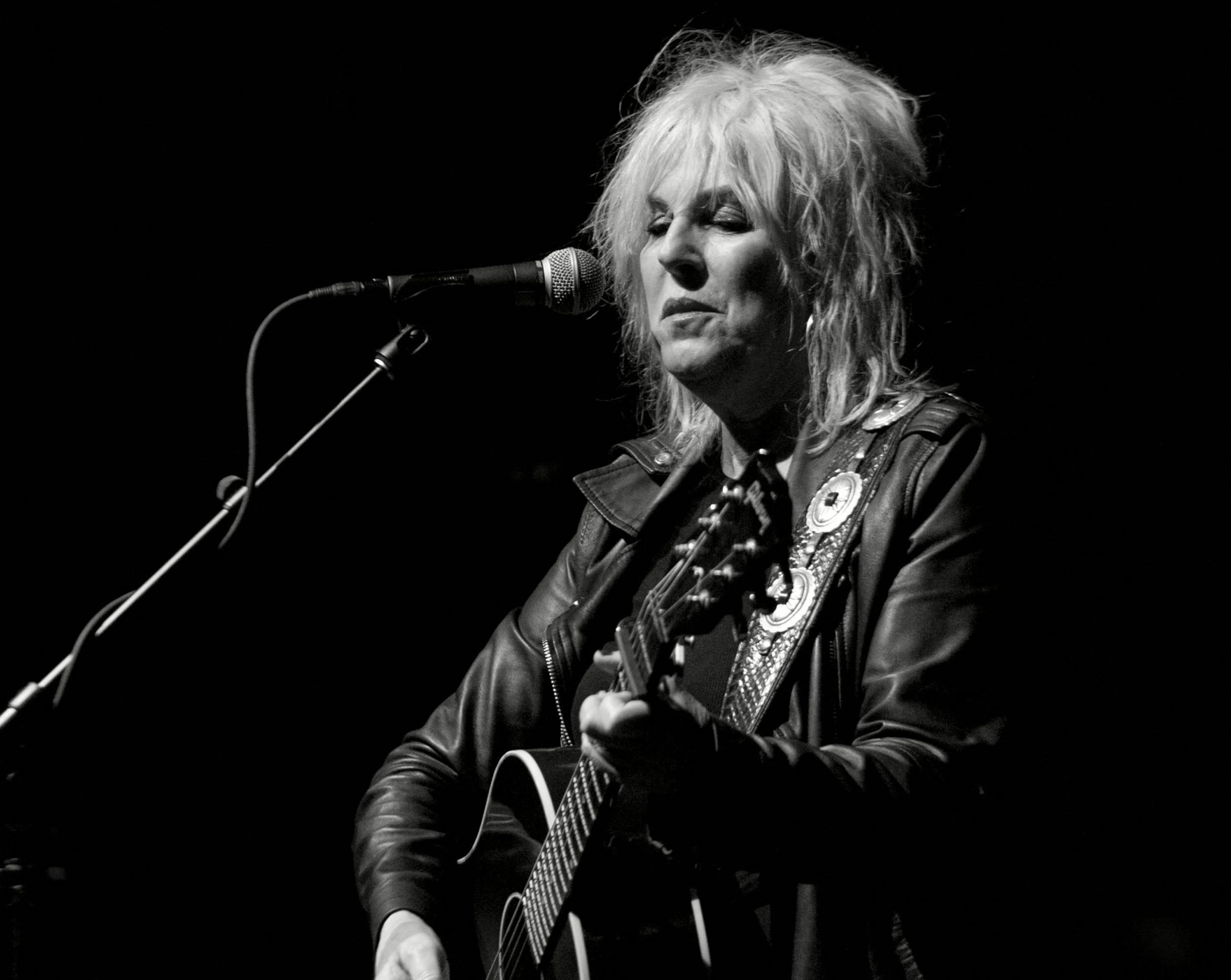Lucinda Williams: ‘I’m here to show people all the good stuff can happen to older women’
The country-rock legend is taking aim at Trump with her politically charged new album. She talks to Helen Brown about the state of the US, finding her way out of an abusive relationship, and why she refuses to mellow with age


Your support helps us to tell the story
From reproductive rights to climate change to Big Tech, The Independent is on the ground when the story is developing. Whether it's investigating the financials of Elon Musk's pro-Trump PAC or producing our latest documentary, 'The A Word', which shines a light on the American women fighting for reproductive rights, we know how important it is to parse out the facts from the messaging.
At such a critical moment in US history, we need reporters on the ground. Your donation allows us to keep sending journalists to speak to both sides of the story.
The Independent is trusted by Americans across the entire political spectrum. And unlike many other quality news outlets, we choose not to lock Americans out of our reporting and analysis with paywalls. We believe quality journalism should be available to everyone, paid for by those who can afford it.
Your support makes all the difference.You can’t rule me!” roars Lucinda Williams from her sofa in Nashville, where she is quarantined with her husband and manager Tom Overby. Other artists of her vintage have comforted fans through the pandemic with cosy renditions of old favourites, but Williams wants to fire viewers up with her defiance of America’s “dangerous” president.
With her kohl-rimmed eyes, peroxide punk hair and ripped jeans, the 67-year-old country rocker has repeatedly scoffed at those who expected her to mellow with age. Her USP has always been the snarling, underdog determination that saw her continue writing, recording and playing dive bars for two decades before finally achieving critical and commercial credibility with her fifth album, 1998’s Grammy-winning Car Wheels on a Gravel Road.
Even though she was named America’s best songwriter by Time magazine in 2002, her fans are still mostly the kind of people who like to think she’s their secret. They post love hearts and share painful personal stories beneath her lockdown video, which features two songs from her ferocious 14th album, Good Souls Better Angels. “You Can’t Rule Me” is a political reworking of Memphis Minnie’s 1937 blues hit of the same name, while “Man Without a Soul” is another new Trump takedown that begins, “You are a man without truth/ A man of greed, a man of hate.”
When I call her a few days after she made the video, I admire the way she’s rocking the lockdown. But she tells me that although tearing through the new material made her “feel powerful”, she is also feeling vulnerable. This is unsurprising, when you learn that one of her friends was singer-songwriter John Prine, with whom she recorded the duet “Wedding Bells” in 1999, and who died from coronavirus on 7 April – “making heaven,” she says, “a lot more interesting”.
Then, when she uploaded links to “Man Without a Soul” to the comments section of a New York Times article on Trump, she was hurt to see “negative responses“ rather than the widespread support she was expecting. ”One person said, ‘I thought Lucinda was a compassionate person, she doesn’t have the right to sing this kind of song.’ Somebody else said I sound like I’m having a heart attack when I’m singing. Another said the usual stuff, that musicians don’t have the right to get involved in politics. It was really upsetting. I don’t usually read the comments and this is why.”

“The human brain isn’t wired for this situation,” she says. “Our primal instincts prompt us: fight or flight. But we can’t do either. We’re frozen. It’s mentally exhausting. I’m washing my hands, washing the door handles… Trump wants to get back to work now and the whole thing is so twisted.
“The problem here,” she continues, is that in the States, “we don’t have the social support to help people get through this.” Currently, there are protests happening across the country, and Williams – who lived hand to mouth for years – relates to the struggle of everyday Americans struggling to pay their bills. “They feel they need to get back out to the workplace. That’s going to make things worse and it’s horrible. It’s frustrating because there’s no lack of money in America, it’s just in increasingly few hands.”
It doesn’t help her anxiety levels that Williams and Overby only moved to their new home a few months ago. Within weeks a tornado had ripped off parts of the roof and the porch light, so that food delivery services now find the house harder to spot in the dark. “I say to Tom: ‘We’ve had this twister, now a plague. Are the locusts coming next?” The humour in her Southern drawl is drought-dry.
Born in Lake Charles, Louisiana, in 1953, Williams describes her childhood as a gothic gumbo of experiences. Her father was the biochemist and poet Miller Williams, best known for reading his poem “Of History and Hope” at Bill Clinton’s second inauguration. Miller’s work as a professor meant Lucinda and her younger brother and sister had an itinerant childhood with stops in Mexico and across the Deep South. Lucinda’s mother, Lucille, was an amateur pianist but also, she tells me “an alcoholic with mental health problems”. Depression was not openly acknowledged by many people at the time, but Miller always told his kids: “‘If something were to happen with your mother, it’s not her fault. She’s not well’,” remembers Williams.
Enjoy unlimited access to 100 million ad-free songs and podcasts with Amazon Music
Sign up now for a 4 month free trial (3 months for non-Prime members)
Enjoy unlimited access to 100 million ad-free songs and podcasts with Amazon Music
Sign up now for a 4 month free trial (3 months for non-Prime members)
Miller and Lucille divorced in 1960 and, unusually, their father took custody of the children. Lucinda – who showed musical promise from an early age – was writing her own songs at 12 and performing them by 17. She also became aware that she sounded a little different. “All the female singers [of that time],” she says, “had these beautiful high voices: Joan Baez, Judy Collins, Emmylou Harris. I didn’t.”

Harris – who once told me she spent a long time struggling to break free of the confining prettiness of her early work – once said Williams had a voice that can scrape “the chrome off a trailer hitch”. Harris thought the grit and drama in her friend’s sound was “an example of the best of what country at least says it is,” and railed against those who refused to give Williams a break.
But Williams – who has grown to love the “richness and reality” in her voice – thinks her early doubts about it helped make her a better songwriter. She drew inspiration instead from Bob Dylan. “He didn’t have an easy voice,” she says. “I learned from him that I could still make it if I worked hard on my songwriting.” She would regularly show her lyrics to her dad who reminded her that “every additional word dilutes a sentence”.
Father and daughter were united not just by art, but by their rebel spirit. Miller was fired from McNeese State University in the 1950s for refusing to take the Louisiana loyalty oath. Lucinda delighted him 20 years later when she was thrown out of her New Orleans high school for refusing to recite the Pledge of Allegiance to protest the Vietnam War.
Miller quit another university job after he was hauled over the coals for publishing a review of Anne Sexton’s poem “Ballad of the Lonely Masturbator”. Says Williams, “my dad was always very open about sex. He was a scientist too and had a very pragmatic attitude to sexuality. He told me the facts of life.”
Critics often praise the eroticism in Lucinda’s songs. But initially record labels were wary of it. Given the sexually extreme content of contemporary pop music at that time (think of what Prince and Madonna were doing), it seems extraordinary that music executives would have fretted over songs like 1988’s “Passionate Kisses”, which earned Williams her first songwriting Grammy Award, after Mary Chapin Carpenter recorded it in 1992. “Do I want too much?” the song goes. “Am I going overboard to want that touch?/ I shout it out to the night/ Give me what I deserve ‘cause it’s my right.”
It’s worth noting that a fulfilling sex life is only one of the “rights” she calls for on the song. She also calls for: warm clothes, food, a comfortable bed and “a full house and a rock’n’roll band/ Pens that won’t run out of ink/ And cool quiet and time to think/ Shouldn’t I have this?” I wonder if the male execs were more threatened by her demands for creative control than the sex stuff.
But it’s true that, while seldom explicit, her songs are great examples of a mature woman expressing a sexual directness that was uncommon on the conservative country scene 20 years ago. There’s a sultry slow burn to songs such as “Essence” (from her 2001 album of the same name).
Williams recently told The New York Times’s Ariel Levy that a woman attending a House of Blues show started masturbating while she performed the song. “The police were called,” she said. “Apparently she was kicking the police because she wasn’t finished yet… which I can totally understand.”
The dance of danger and desire in Williams’s songs is a direct reflection of her own romantic experiences. One early boyfriend was the poet and serial philanderer Frank Stanford, whose work had been championed by Miller Williams. He seduced his mentor’s wild daughter with his easy charm and a Southern lyricism that combined his warm voice with a darker death wish. Stanford was married and probably dating at least seven women on 3 June 1978. Early in the morning, he sent flowers to Lucinda. Later that day, he found out that his wife and the woman he was living with had been comparing notes and he shot himself dead.
Miller Williams was summoned to help clean up Stanford’s blood while Lucinda was, unaware of the tragedy, arranging the flowers he’d sent in a vase. She memorialised him on 1992’s “Sweet Old World”: “See what you lost when you left this world, this sweet old world/ The breath from your own lips, the touch of fingertips…”
On the new song “Walkin’ Out”, meanwhile, she offers a devastating account of the domestic violence she experienced with the boyfriend she left before finally meeting her second, and current husband. Keeping her voice steady, she says: “I’d been in emotionally abusive relationships before. But that one became physical. I never thought I would find myself there. It crept up on me and it surprised me.”
The man was living in a rehabilitation centre when they met. “And this is how stupid I was,” she says. “I didn’t realise that somebody in the middle of rehab shouldn’t be encouraged to move out of a sober living house and move in with me. He wasn’t prepared to enter the real world. At first he was only drinking a little here and there. His drink of choice was whiskey. I used to think all alcohol was the same but then I learned that different drinks do different things. When he drank whiskey, he would turn. It was like he didn’t know me.”
Things escalated slowly until “he started sneaking down to the basement, mixing heroin with cocaine, shooting up speedballs. He hid it. I’d never been around that before. He was crazy, weird, unpredictable. I remember sitting on a stool at the kitchen counter and he pulled the stool out from under me and I ended up on the floor. But he’d wake up the next day and wouldn’t remember what happened. I’d tell him and he’d say: ‘Oh, baby, baby, I’m so sorry, I love you, it’ll never happen again.’ You go into a very strange state. You kinda numb yourself. Like a child in a frightening situation, you go into survival mode.”
She says the relationship “ended late one night when he was very f***ed up. It was probably early in the morning. He actually told me to go, to get out. I ran next door to the landlord and knocked on their door. It felt like I was in a dream. The landlord’s wife let me in, she offered me a shower and some clean pyjamas. I called a mutual friend who was in AA and came and took Matthew to a rehab place.”
Williams has actually written about the relationship before. “’Buttercup’ and ‘Jailhouse Tears’ are both about it,” she says, “but they were different kinds of songs. Not as heavy as ‘Walkin’ Out’. If you go back, you can see my trying to deal with it through writing but this was the motherload that’s been waiting to come out of me.”
Even after she’d written the song, Williams wasn’t sure she should record it. “But all the guys in the band insisted,” she says, “and their support really moved me.
“Now I understand battered women syndrome,” says Williams. “I used to think: what’s her problem? Why doesn’t she walk away? It’s not real easy to admit that I got into something like that, but it happened and now I know it can happen to anyone.”
She is also frank about the sexual discrimination she has faced in the music industry. “There’s a power in being a woman with a guitar. But also men feel threatened,” she says. “I remember losing gigs because bar owners ‘already had enough chick singers’. That stuff was hard. You get used to being the only woman in a room, too. I remember being backstage at one blues place, I was about 20 years old. A bunch of guys were drinking beer. Suddenly one of them just fixed me with a stare and said: ‘I wanna eat your box.’ A phrase I’d never heard before. I kinda knew what he meant and didn’t want to. So gross.” And nobody said anything? “No. I think there were just some awkward chuckles.”

The sexism continued after she met Tom Overby in her fifties and found herself in the first happy relationship of her life. “He’s my soulmate,” she says. “I’m here to show people all the good stuff can happen to older women,” she tells me. “That’s become my narrative. But my fans were worried I wouldn’t be able to write good songs after meeting him. I’m not sure people would be concerned about that if I were a man. People should know I’m always an artist first and, believe me, there’s enough painful history to draw on!”
Because Williams was so wounded by the comments she received on The New York Times’s site, she didn’t look at what was posted under her lockdown video. But the comments on YouTube are brimming with solidarity and admiration. I read her one that I thought she’d like most:
“There’s a cypress tree out my kitchen window on the lake shore. She’s been through it, hit by multiple lightning strikes and storms that have left her trunk bare and burnt and twisted over the decades… You would almost think she’s gone until you get closer and see the effusive glory of green live branches reaching in every direction like a wild punk rock haircut at the top of her. She’s tough and she’s glorious and I named her Lucinda.”
There’s a silence down the line from Nashville. Then a sigh. “That’s me,” says Williams. “That’s just… wow. That’s lovely.”
Good Souls Better Angels is out now
Join our commenting forum
Join thought-provoking conversations, follow other Independent readers and see their replies
Comments